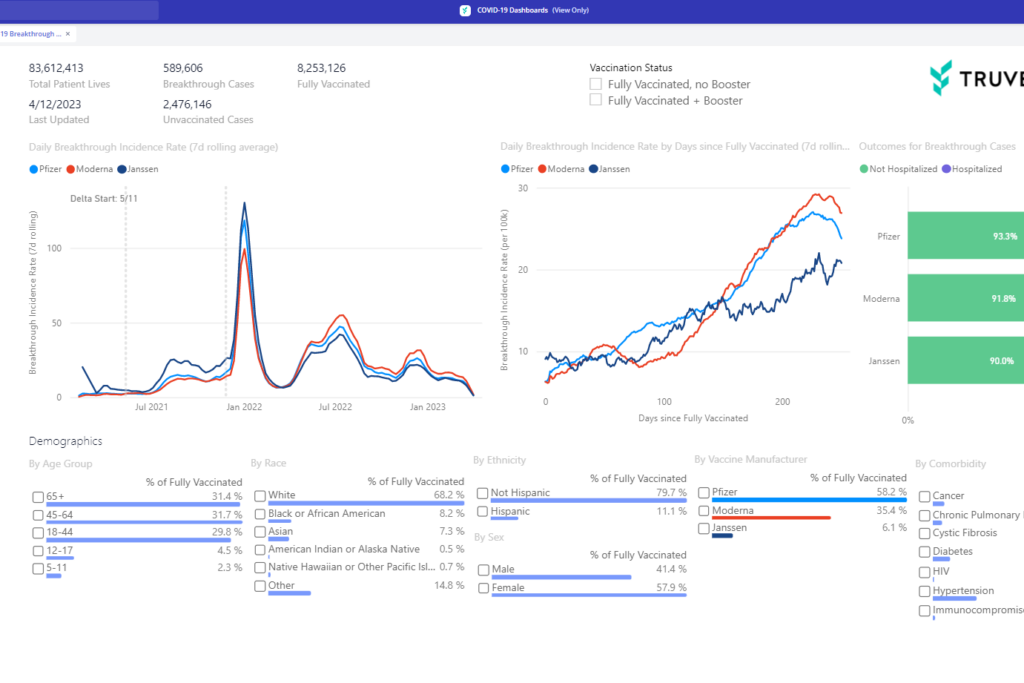
How Truveta is using data and AI to improve patient care and save lives
The team of researchers sought answers to an important question: How often do women in the United States who have preeclampsia — high blood pressure during pregnancy — also experience heart failure, and does race factor into the situation?
Fewer than three weeks after launching their study, the researchers at Truveta, a collective of U.S. health systems, uncovered a startling finding: Black women are twice as likely to experience preeclampsia-related heart failure as white women.
Previous research had linked preeclampsia to heart failure, but the Truveta study, which included data on almost 500,000 women, was the first to uncover the extent of the danger facing Black women with the condition.
Conducting that type of research would typically take months, possibly more than a year, to gather the data and secure the necessary permissions, says Charlotte Baker, lead researcher on the study.

“It was unbelievably fast,” says Baker, Truveta’s director of epidemiology. “And that means we were able to get those answers and immediately start discussions with clinicians about what we should do about this issue and how we should use this information.”
Such is the promise of Truveta, a Bellevue, Washington-based company founded in 2020 with a mission of saving lives with data. Its health data and analytics solution, Truveta Studio, includes complete and de-identified medical data from more than 80 million patients served by Truveta’s 28 health system members, which operate more than 20,000 clinics and 700 hospitals across the United States.
Health care data is often fragmented, inaccessible and messy, making research slow and cumbersome. Much of the available data on patients comes from insurance claims and does not provide a comprehensive view of overall health. The data might identify that a patient had a procedure but say nothing about the outcome, or confirm a diagnosis but provide no information about symptoms.
Truveta trained a large language model to aggregate data from 28 leading health systems in the U.S., including complete information from patients’ electronic health records — from diagnoses to medications and test results — to provide a representative view of patient care across the United States. This data is combined with data on mortality, social drivers of health and claims data to provide a complete, de-identified picture of a patient’s journey.

Using Truveta Studio, which is built on Azure and updated daily, researchers can quickly gain insights on almost any medical condition, drug or device, and drill down to focus on a specific patient population.
The platform de-identifies patient data and uses Truveta’s AI model to standardize the diverse medical terminology used by doctors and health systems — COVID-19, for example, can be defined in many terms and with different codes, making it difficult for researchers to capture a patient population without knowing what those various definitions are.
AI also enables Truveta to access the rich information that is normally locked in clinician’s notes, critical details such as a patient’s disease progression, symptoms and response to medication. A data set might include a medication a patient took and a resulting side effect, but the two factors would not be linked in the data, only in a doctor’s note. Truveta Studio so far includes more than 2.5 billion of those notes and the number is quickly growing.
“Having that information from clinical notes available to search will be game-changing,” says Dr. Guilford Parsons, chief of operational analytics at Providence, one of Truveta’s founding members. “That’s the kind of information that we don’t see unless we have access to notes or entities extracted from the notes. There just isn’t a place other than the notes that you can reliably find that.”
Truveta has announced partnerships with biopharma giant Pfizer for COVID research and medical device manufacturer Boston Scientific, which is using Truveta data to gain insights on various devices and conditions, including peripheral artery disease.
Truveta’s own research team has released studies on a range of timely issues, including the link between long COVID-19 and mental health, rates of respiratory syncytial virus (RSV) hospitalization, and in the wake of Buffalo Bills defensive back Damar Hamlin’s on-field collapse in January 2023, a look at how often cardiac arrest occurs while playing sports. The latter study, Baker says, was done in less than a week.

“In my previous life as an academic researcher, it would have taken me more than three years to answer that question,” she says. “I happen to know that because I was working on a similar question.”
Truveta started as an idea within Providence around 2018 to compile a data set from health care providers and make it available to researchers. The need for better health data became starkly evident during the early days of the coronavirus pandemic, when a lack of timely information made it hard to know how to treat COVID-19 patients.
“We were in hospitals treating a lot of patients with essentially no data,” says Dr. Nick Stucky, Truveta’s vice president of research and a practicing infectious diseases doctor and researcher at Providence. “Essentially, we were flying blind for quite a while. That really accelerated the creation of Truveta.”
For Stucky, the granularity and scale of Truveta’s data offers tremendous value for understanding infectious diseases; as a physician, he also sees potential for Truveta to provide insights and inform clinical decision-making.

“We’re all seeing part of the whole puzzle, but there’s so much value in the large data set to be able to see the whole of the system,” he says. “Time is patient life, and the way this can accelerate findings is going to save lives.”
Terry Myerson, Truveta’s CEO and a former Microsoft executive, co-founded the company in 2020 with Providence, Advocate Health, Tenet Health and Trinity Health. Other health systems quickly got on board, and the company launched Truveta Studio in November 2022, making the platform available to health systems and life sciences researchers.
To develop its AI model, Truveta hired a team of informaticists and medical terminologists, clinicians across multiple disciplines, to train and validate it. Truveta’s model is now smart enough to apply natural language processing to clinician notes to recognize relationships between concepts. A researcher studying heart disease, for example, could see when a particular medication is not working or when medical images show changes that could require a different treatment.

By normalizing medical terminology across health systems, Truveta enables health systems to collaborate, Parsons says, and to conduct their own research with a much larger patient population. He mentions a study that Providence, which operates 51 hospitals across five Western states, released in 2021 on the rare side effects of myocarditis and pericarditis, types of heart inflammation, following COVID-19 vaccinations.
“If we had done that study on Truveta, we probably would have been able to publish even faster and across a greater population,” Parsons says. “Truveta has done a great job of normalizing the data types that are always at high risk for incompatibility, especially if you look across our different systems.”
Truveta is aiming to help researchers study patient care and improve health disparities. The company was intentional about bringing on health system members that represent racially and ethnically diverse populations across all 50 states and includes social drivers of health (SDOH) in its data. Truveta recently expanded its data set to 45 SDOH attributes including housing stability, education and social support.
Mitchell Cornet, vice president of public health, community vaccines and strategic partnerships for New York-based Northwell Health, a Truveta member, says including those determinants in Truveta’s data is key to understanding the circumstances that can impact overall health. A woman who doesn’t have transportation, he points out, will have a harder time getting to doctor’s visits than a woman who does, and is therefore less likely to get sufficient prenatal care.

“Having SDOH in Truveta’s data is going to be beneficial for researchers because they’re going to see what some of these intrinsic factors are that could potentially be leading what the data tells you,” he says. “I think that’s critical. Truveta is a voice for those who can’t be heard, because they have a platform that thousands and thousands of people can access.”
Truveta’s research team is now expanding its study on preeclampsia-related heart failure to look at how factors such as disability or the number of children women have might impact their risk. The issue is a personal one for Truveta’s Baker, who lost a friend and colleague to the condition shortly after giving birth.
Truveta, Baker says, has been able to combine technical knowhow with clinical expertise to provide a large-scale data set that can be used across health systems, life sciences, government and academia to improve the health of Americans.
“Truveta has this unique share of data that is really going to be the difference-maker in how we move forward clinical medicine and public health, and I think it’s overdue,” she says. “I’m fascinated to get to answer some questions with that information and be able to make a difference. That’s what we’re there for — saving lives with data.”
MEDICAL DEVICE DISCLAIMER: Microsoft Azure, including any of its component technologies, is intended for general-purpose use and is not intended or made available: (1) as a medical device; (2) for the diagnosis of disease or other conditions, or in the cure, mitigation, treatment or prevention of a disease; or (3) as a substitute for the professional clinical advice, opinion, or judgment of a treating healthcare professional. Microsoft Azure has not been evaluated by the U.S. FDA or similar regulatory agency as a medical device, and users of Microsoft Azure are responsible for ensuring the regulatory compliance of their use or any solution they build using Microsoft Azure.
Top photo by Getty Images E+ collection. All other photos courtesy of Truveta and Northwell Health.

